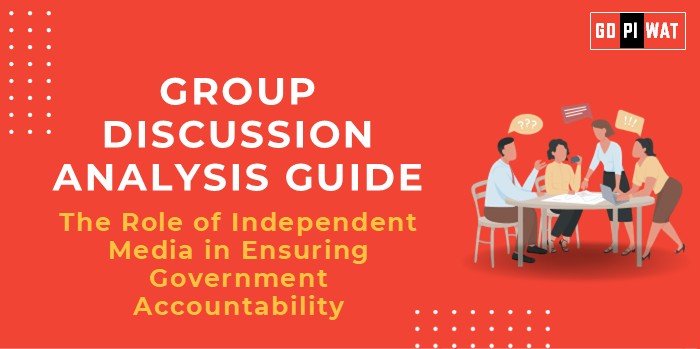📋 Group Discussion Analysis Guide
🌟 The Role of Independent Media in Ensuring Government Accountability
🌐 Introduction to the Role of Independent Media
Independent media is often referred to as the “fourth pillar of democracy,” crucial for promoting transparency and accountability in governance. Globally, vibrant democracies prioritize media freedom to expose corruption, ensure citizen participation, and influence policy reforms.
Independent media has evolved from print journalism to digital platforms, playing a transformative role in scrutinizing power structures. High-profile investigations like the Panama Papers exemplify how media fosters accountability. However, increasing threats to press freedom have raised concerns about its sustainability.
📊 Quick Facts and Key Statistics
- 📉 Press Freedom Index 2023: India ranked 161 out of 180 countries, indicating significant challenges for independent journalism.
- 🌐 Digital Penetration: Over 1.1 billion mobile subscriptions enable widespread access to media but also increase exposure to misinformation.
- 💰 Ad Revenue Dependency: 75% of media houses rely on advertising revenue, leading to potential conflicts of interest.
- ⚠️ Journalist Fatalities: 35 journalists killed globally in 2023 for exposing corruption or organized crime (UNESCO).
👥 Stakeholders and Their Roles
- Media Organizations: Investigate and report, shaping public opinion and ensuring transparency.
- Government: Enacts policies influencing press freedom, often under scrutiny for media control or censorship.
- Public: Engages with media to demand accountability and participate in democratic processes.
- International Organizations: Advocate for press freedom, offering support and highlighting violations (e.g., Reporters Without Borders).
✨ Achievements and Challenges
🏆 Achievements:
- Landmark investigative journalism like the 2G spectrum scandal reshaped Indian political accountability.
- Digital platforms enabled citizen journalism and whistleblowing.
- Global recognition through Pulitzer wins for Indian journalists in 2022 showcased their impact.
⚠️ Challenges:
- Rising instances of journalists facing legal and physical intimidation.
- Spread of fake news undermines public trust.
- Commercial pressures limit independent reporting due to reliance on ad revenue.
🌍 Global Comparisons
- Success: Nordic countries lead in press freedom with robust protections against government interference.
- Challenges: Turkey faces significant curbs, with 90% of media aligned to state interests.
📚 Structured Arguments for Discussion
✅ Supporting Stance:
“Independent media ensures democracy thrives by holding governments accountable through transparency.”
❌ Opposing Stance:
“Media’s reliance on advertising revenue compromises its independence and impartiality.”
⚖️ Balanced Perspective:
“While media plays a vital role in accountability, regulatory and funding reforms are needed to safeguard its integrity.”
💡 Effective Discussion Approaches
- Quote: “Freedom of the press is not just important to democracy, it is democracy.” – Walter Cronkite.
- Statistics: Highlight India’s rank in press freedom and its implications.
Counter-Argument Handling: Propose solutions like stringent fact-checking mechanisms and decentralized funding models like public broadcasting.
🔍 Strategic Analysis of Strengths and Weaknesses
- Strengths: Investigative power, public trust, technological reach.
- Weaknesses: Censorship, misinformation, financial dependencies.
- Opportunities: Crowdfunded journalism, global collaborations.
- Threats: Legal curbs, violence against journalists.
📈 Connecting with B-School Applications
- Real-World Applications: Explore case studies on corporate governance reforms spurred by media exposure.
- Sample Interview Questions:
- “How can media organizations balance independence with financial sustainability?”
- “Discuss the role of investigative journalism in shaping public policy.”
Insights for Students: Media-driven accountability fosters responsible leadership and policy innovation.


